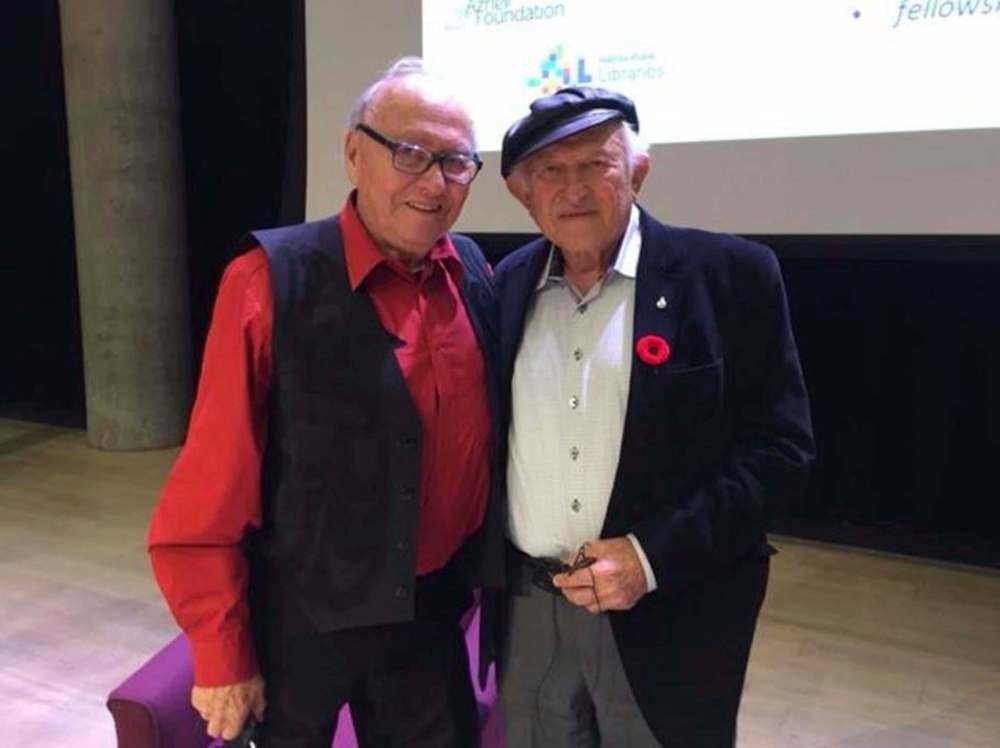Separate horrors bring survivors together at human rights museum
Advertisement
Read this article for free:
or
Already have an account? Log in here »
To continue reading, please subscribe:
Monthly Digital Subscription
$0 for the first 4 weeks*
- Enjoy unlimited reading on winnipegfreepress.com
- Read the E-Edition, our digital replica newspaper
- Access News Break, our award-winning app
- Play interactive puzzles
*No charge for 4 weeks then price increases to the regular rate of $19.95 plus GST every four weeks. Offer available to new and qualified returning subscribers only. Cancel any time.
Monthly Digital Subscription
$4.99/week*
- Enjoy unlimited reading on winnipegfreepress.com
- Read the E-Edition, our digital replica newspaper
- Access News Break, our award-winning app
- Play interactive puzzles
*Billed as $19.95 plus GST every four weeks. Cancel any time.
To continue reading, please subscribe:
Add Free Press access to your Brandon Sun subscription for only an additional
$1 for the first 4 weeks*
*Your next subscription payment will increase by $1.00 and you will be charged $16.99 plus GST for four weeks. After four weeks, your payment will increase to $23.99 plus GST every four weeks.
Read unlimited articles for free today:
or
Already have an account? Log in here »
Hey there, time traveller!
This article was published 25/04/2018 (2818 days ago), so information in it may no longer be current.
They grew up on opposite sides of the planet, in different cultures, where powerful forces were at work trying to wipe out their identities. As kids, they both survived traumatic events and both are now master storytellers who will be joining forces in Winnipeg on Sunday.
Winnipeg’s Theodore Fontaine, who survived residential schools, and Toronto’s Nate Leipciger, who survived the Holocaust, are coming together at the Canadian Museum for Human Rights to share their experiences and how they’ve moved toward healing.
Fontaine is a former chief of the Sagkeeng Ojibway First Nation and survivor of the Fort Alexander and Assiniboia Indian Residential schools.

When he attended Fort Alexander Indian Residential School as a younger student, he said he was shown films that demonized and denigrated the indigenous. “It made me hate my own people,” he said last year, in a Free Press interview about the Assiniboia Indian Residential School reunion he was helping organize for classmates and neighbours of the long-defunct school in River Heights. Fontaine has spoken to thousands of students and adults across Canada about his experiences and the need for reconciliation.
In 2010, Fontaine’s Broken Circle: The Dark Legacy of Indian Residential Schools: A Memoir was published.
He has said he has some good memories of the Winnipeg school but knows much damage was caused by the residential system.
It operated between approximately 1870 and 1996, with more than 150,000 Indigenous children removed from their families and communities. They were required to spend most of the year learning to despise their own peoples and cultures.
The schools were set up to address the “Indian problem” — the notion that Indigenous peoples represented an obstacle to Canadian territorial expansion, property ownership and nation-building.
The solution to this supposed problem was thought to be assimilation — destroying Indigenous groups by forcibly transforming their children.
Leipciger was an 11-year-old boy whose family was forced to leave their home when Nazi Germany invaded Poland and they were moved to a ghetto. At age 15, he was transferred to Auschwitz-Birkenau concentration/extermination camp.
His mother and sister were killed in Auschwitz, but his father survived and protected him.
Leipciger ended up in a subcamp of the Dachau concentration camp, where the prisoners were liberated by American soldiers.
In June 1948, Leipciger and his father immigrated to Canada. He has been called a trailblazer in Holocaust education, bringing heart and humanity to history.
In 2015, his book Weight of Freedom, about life and death at Auschwitz-Birkenau and other slave-labour and concentration camps, was published. In 2016, Leipciger served as Prime Minister Justin Trudeau’s guide on a tour through Auschwitz-Birkenau.
Leipciger met Fontaine when the Azrieli Foundation and the non-profit organization Facing History and Ourselves brought the two survivors together for a series of talks in Toronto with university and high school students.
They last spoke at an event in Halifax in November. Sunday will be the first time they’ve appeared together in Winnipeg.
They plan to talk about the process of writing their memoirs. Their conversation about loss, trauma and the writing of memoirs will focus on their unique personal experiences and where they intersect on their healing journey, said moderator Leora Schaefer, executive director of Facing History and Ourselves Canada.
The event takes place Sunday at 7 p.m. at the Canadian Museum for Human Rights. Admission is free but attendees are asked to RSVP by Wednesday at powerofmemoir.eventbrite.com.
carol.sanders@freepress.mb.ca

Carol Sanders
Legislature reporter
Carol Sanders is a reporter at the Free Press legislature bureau. The former general assignment reporter and copy editor joined the paper in 1997. Read more about Carol.
Every piece of reporting Carol produces is reviewed by an editing team before it is posted online or published in print — part of the Free Press‘s tradition, since 1872, of producing reliable independent journalism. Read more about Free Press’s history and mandate, and learn how our newsroom operates.
Our newsroom depends on a growing audience of readers to power our journalism. If you are not a paid reader, please consider becoming a subscriber.
Our newsroom depends on its audience of readers to power our journalism. Thank you for your support.
History
Updated on Wednesday, April 25, 2018 11:24 AM CDT: Clarifies with reference to Azrieli Foundation

